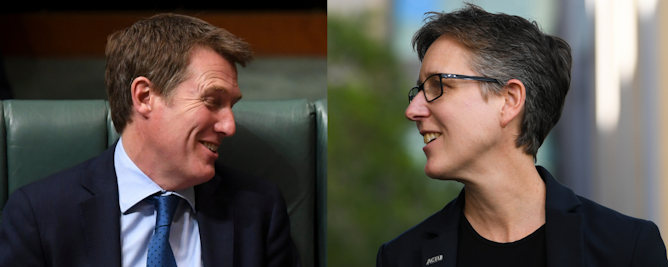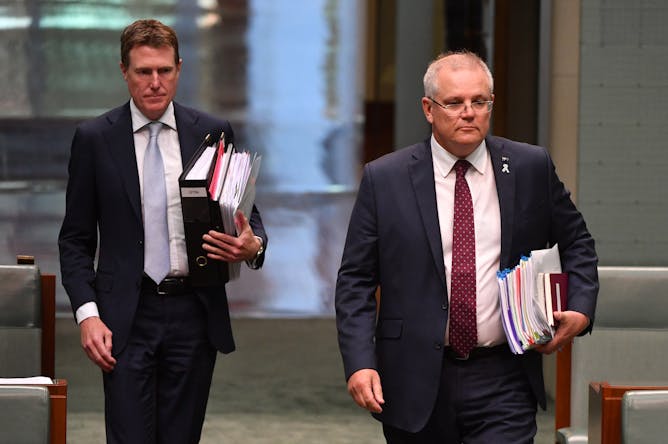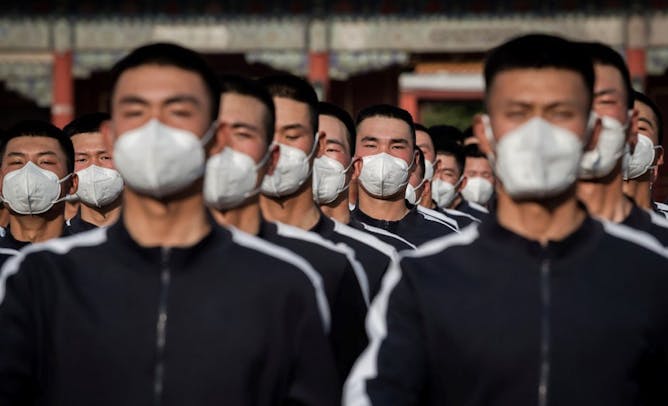|
|
|
|
Behind Scott Morrison’s bold bid, outlined this week, for a consensus approach to the volatile industrial relations landscape is an unusually strong relationship between Attorney-General Christian Porter and ACTU Secretary Sally McManus.
While on the face of it, the two appear to have little in common, Michelle Grattan writes, Porter is a policy wonk and McManus is smart, sharp and knows what she’s talking about, enabling them to find a middle ground. At any rate, the strong relationship between the two is a bonus for Morrison in his bid for reform.
The government’s gambit is shrewd politics and may be canny economics, says UNSW economics professor Richard Holden.
He suggests Morrison may have realised his real power is not as an advocate but a broker, with his proposed process analogous to the Dayton Accords, the peace agreement that ended the Bosnian War in 1995. “Morrison’s gambit may not work,” Holden writes, “but it is certainly worth a shot.”
And finally, we invite all readers to support The Conversation with a tax deductible donation. We’re a non-profit charity and need your support now more than ever. https://donate.theconversation.com/au
Heartfelt thanks to all who have already generously donated, it makes a big difference.
|
Amanda Dunn
Section Editor: Politics + Society
|

|
|

Lukas Coch/AAP
Michelle Grattan, University of Canberra
Perhaps a silver-lining of the pandemic, the economic downturn has created a more constructive discourse between the minister for industrial relations and the unions.
|

Federal industrial relations minister Christian Porter with Prime Minister Scott Morrison.
Mick Tsikas/AAP
Richard Holden, UNSW
Scott Morrison may have realised his real power is not as an advocate but a broker.
|

David Mariuz/AAP
Kristy Hess, Deakin University
News Corp's announcement it will stop printing 100 suburban and community newspapers is another blow for regional Australia and the the media landscape more broadly.
|

MORGAN SETTE/AAP
Bronwyn Fredericks, The University of Queensland; Sarah Holcombe, The University of Queensland
The coronavirus crisis has demonstrated how vital local-level decision-making is in Indigenous affairs – and why the government needs to listen more often.
|

The Chinese army marches past the entrance to the Forbidden City on the occasion of the 2020 session of the National People’s Congress on May 22 in Beijing.
Nicolas Asfouri/AFP
Gemma Ware, The Conversation; Thibault Lieurade, The Conversation; Camille Khodor, The Conversation
This week, our experts are looking at the major trends in post-crisis globalisation.
|
Cities
|
-
Thami Croeser, RMIT University
Distancing rules will make life very difficult for smaller bars, cafes and restaurants. Our streets can be modified quickly to help save an important part of the life of cities and their economies.
|
|
Science + Technology
|
-
Jonathan Roberts, Queensland University of Technology
Amazon's planned upcoming 'Just Walk Out' technology will let customers take items off a store's shelf, bag them, and walk straight out.
-
Nik Thompson, Curtin University
While some online services such as banking do warrant using your true information, many sites shouldn't require the same level of disclosure. Here's how to protect yourself in such cases.
|
|
Arts + Culture
|
-
Malcolm Burt, CQUniversity Australia
Between home and work is a window of time and space where we can choose our distractions. Staring out the train window, scrolling the news or perhaps listening to podcasts. We miss it.
|
|
Environment + Energy
|
-
James Hitchcock, University of Canberra
To inner west Sydneysiders, the Cooks River is known to be particularly polluted. But after a storm, microplastic particles increased more than 40 fold.
-
Michael (Mike) Joy, Te Herenga Waka — Victoria University of Wellington
A long-awaited NZ$700 million package to clean up New Zealand's rivers and lakes has disappointed some of the government's expert advisers – especially a delay on setting clear pollution limits.
|
|
Health + Medicine
|
-
Hannah Dahlen, Western Sydney University; Emad El-Omar, UNSW; Naomi Strout, UNSW
Newborn babies can pick up GBS from their mother's vaginal tract during childbirth.
-
Adrian Esterman, University of South Australia
An easy question, but a difficult answer.
-
Lisa Bricknell, CQUniversity Australia
As restaurants and cafes re-open, here's what you can do to limit the chance of coronavirus transmission.
-
Helen Dickinson, UNSW; Sophie Yates, UNSW
New research shows almost 20% of families caring for children with special needs were unable to buy essential medication during coronavirus.
|
|
Business + Economy
|
-
Jarrod Haar, Auckland University of Technology
Trials show a four-day week really works. With economies desperate for recovery, now could be the perfect time to encourage it.
|
|
| |
Featured jobs
|
|
|
| |
| |
| |

|
| |
| |
| |
Featured Events & Courses
|

|
Level 21, 15 Broadway, Ultimo, New South Wales, 2007, Australia — University of Technology Sydney
|

|
Online, Melbourne, Victoria, 3000, Australia — Australia New Zealand School of Government
|

|
Online Webinar, Hobart, Tasmania, 7000, Australia — University of Tasmania
|

|
Level 4, 40 City Road, Southbank, Victoria, 3006, Australia — Australian Institute of Family Studies
|
|
|
|
| |
| |
| |
| |
| |
|
|
|
|
|
|
|